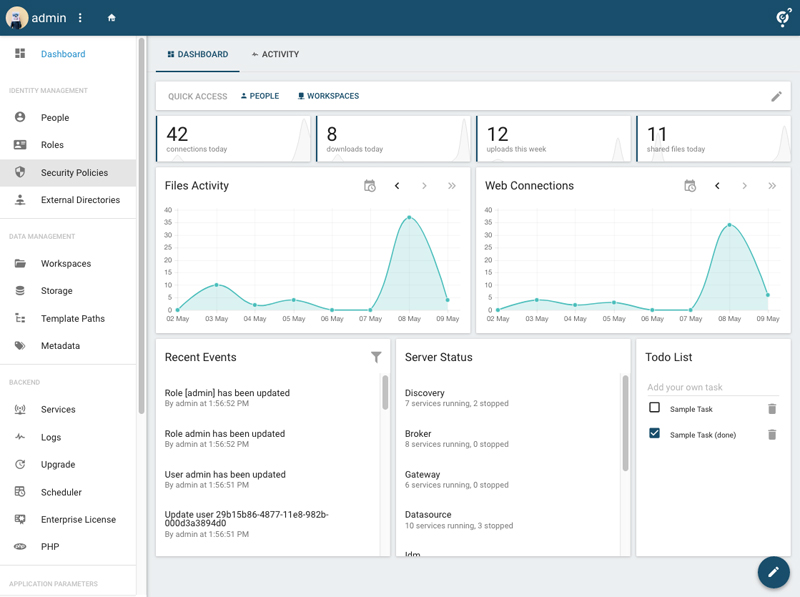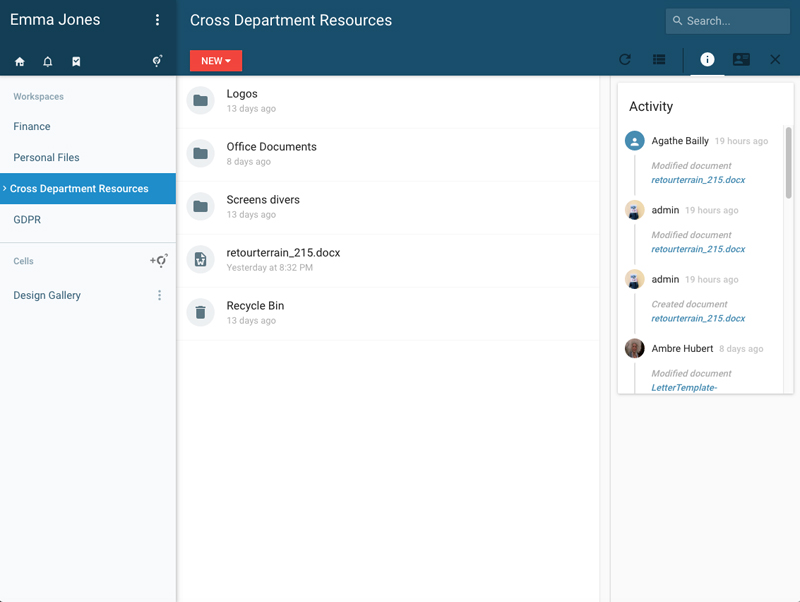

Pydio Cells is a brand-new product focused on the needs of enterprises and large organizations, brought to you from the people who launched the concept of the open-source file sharing and synchronization solution in 2008. The concept behind Pydio Cells is challenging: to be to file sharing what Slack has been to chats—that is, a revolution in terms of the number of features, power and ease of use.
In order to reach this objective, Pydio's development team has switched from the old-school development stack (Apache and PHP) to Google's Go language to overcome the bottleneck represented by legacy technologies. Today, Pydio Cells offers a faster, more scalable microservice architecture that is in tune with dynamic modern enterprise environments.
In fact, Pydio's new "Cells" concept delivers file sharing as a modern collaborative app. Users are free to create flexible group spaces for sharing based on their own ways of working with dedicated in-app messaging for improved collaboration.
In addition, the enterprise data management functionality gives both companies and administrators reassurance, with controls and reporting that directly answer corporate requirements around the General Data Protection Regulation (GDPR) and other tightening data protection regulations.
In tune with modern enterprise DevOps environments, Pydio Cells now runs as its own application server (offering a dependency-free binary, with no need for external libraries or runtime environments). The application is available as a Docker image, and it offers out-of-the-box connectors for containerized application orchestrators, such as Kubernetes.
Also, the application has been broken up into a series of logical microservices. Within this new architecture, each service is allocated its own storage and persistence, and can be scaled independently. This enables you to manage and scale Pydio more efficiently, allocating resources to each specific service.
The move to Golang has delivered a ten-fold improvement in performance. At the same time, by breaking the application into logical microservices, larger users can scale the application by targeting greater resources only to the services that require it, rather than inefficiently scaling the entire solution.
The new Pydio Cells architecture has been built with a renewed focus on the most popular modern open standards:
Functionality around security policies also has been given a major upgrade, with a focus on simplicity, practicality and control:

Figure 1. Administrator Dashboard
Because of the GDPR, the administrator interface in Pydio Enterprise has been extensively redeveloped to deliver clarity and control, and to simplify the task of managing data for compliance. Pydio Cells now features GDPR-compliant logs (separated from the system logs), giving administrators uncluttered access to all the data relevant for data protection regulation and auditing. These logs can be filtered and exported as spreadsheets or CSV files for external reporting.
Pydio Cells delivers file sharing and collaboration in a way that is more familiar, comfortable and intuitive for users of modern collaborative apps. It lets users decide how to share files and information based on knowledge of their own teams, workflows and working patterns. This end-user freedom also takes the responsibility for creating effective workspaces away from overburdened administrators.

Figure 2. User Dashboad
End users now can create their own flexible "Cells", combining files and folders from any location. Cells provide a space for collaborating on documents, which can be based on teams, projects or any other user-defined topic. The Cells concept will be familiar to modern workers used to collaborating on "channels" within popular group-chat applications.
Cells can be shared internally or externally to the organisation, with users able to add new individuals and groups to the Cell. In-app, instant messaging within each Cell then provides a focused channel for group communication around the theme.
Pydio Cells is available for download from https://pydio.com in two flavors: a free community-supported version with contract options and a commercial version with unlimited Level 3 contract support for enterprise deployments. Pricing is available on the website.
—Italo Vignoli